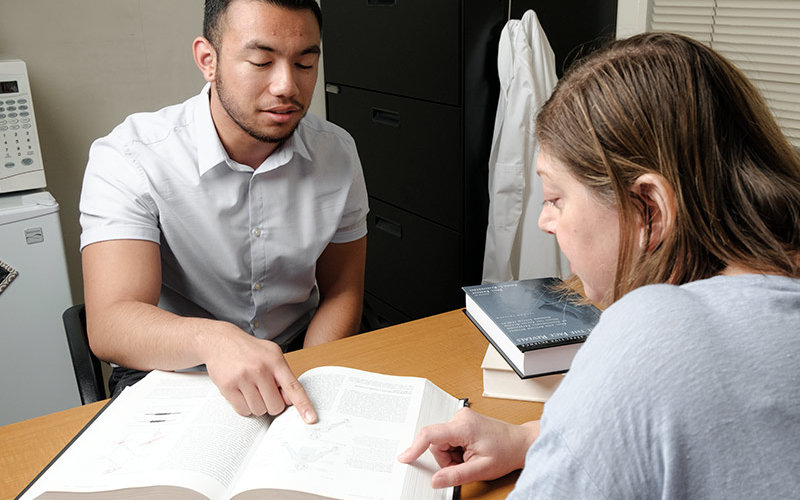
Cal State Fullerton students interested in future careers in research are getting a step up in experience, as well as learning the ins and outs of earning advanced degrees, by being a part of MARC, or Maximizing Access to Research Careers.
The 22-year-old program provides students with wide-ranging programs — from scientific writing to how to present themselves and their research, how to apply to doctoral institutions and write a strong thesis. Scholars are paired with some of the University’s top research faculty members, who help students develop their research findings into articles for peer-reviewed journals, scientific papers and posters presented at professional conferences.
“Our mission has remained the same: to offer an extraordinary opportunity for underrepresented students seeking careers in biomedical research,” says Amybeth Cohen, professor of biological science and director of the program.
Scholars participate in research for an average of 15 hours per week during fall and spring semesters and full-time for eight weeks in the summer. They must attend departmental seminars and specialized classes in addition to regular studies. Each receives stipends to support their research activities.
In addition, first-year scholars attend boot camps that help them “get into the culture of MARC” and prepare for what is on the horizon.
Who are MARC Scholars? Students like psychology majors Erick Aguinaldo and Vanessa Sanchez, who are both driven to go beyond their undergraduate studies to advanced degrees.
Sanchez fell in love with psychology in high school, learning about the different stages of development, “why we are the way we are (personalities), and how researchers try to understand and give meaning to the mind and/or consciousness,” she explains, adding that when she took a biopsychology course, “it made me realize that there is a lot that takes place at the molecular level, and I wanted to learn more!”
“I pursued the MARC program because of their solid curriculum to help guide me in my academic career while also providing me with research experience,” adds the scholar, who hopes to one day attend a doctoral program and become a researcher in neuroscience.
Aguinaldo’s family dynamic influenced his major of psychology with a minor in women’s studies. Raised with two sisters by a single mother, he has been studying sexual objectification and how it can affect academic performance, and the transition when males become interested in the opposite sex.
“When I came to Cal State Fullerton, I didn’t give any thought to an advanced degree. Then, as a sophomore, I got interested in research. A teaching assistant who was a MARC scholar encouraged me to get into the program.
“I hadn’t realized the wide range of research that I could do that didn’t involve the traditional lab coat, beakers, etc.,” he adds.
Scholars also meet regularly to share their work efforts. “It gives us broad exposure to research across all disciplines and stresses the interdisciplinary nature of research,” says Aguinaldo. “MARC is a really good community of peer mentors, who learn and share their experiences.”
“We know that we have been successful when we place undergraduates into respected graduate programs and ensure their success. Over the years we’ve had about a 90 percent success rate — everyone who has gone on, has completed their advanced degree,” says Cohen. “As hard as we have been on them, our graduates really feel that they have a leg up because of the program.”
The MARC Scholars program is funded by the National Institutes of Health. Earlier this year, CSUF was awarded a five-year grant to continue the program. First-year funding is $456,071.